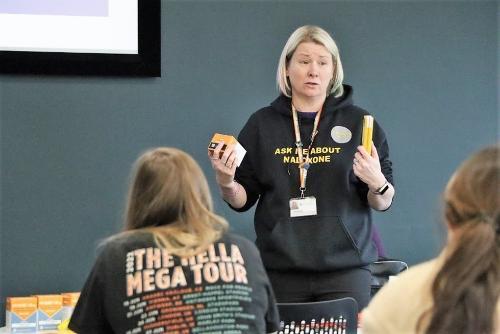Criminology students learn to administer life-saving drug in Wrexham University first

Date: Thursday 20th July, 2023
Criminology and Criminal Justice students at Wrexham University have received training on to administer a life-saving medication, in a bid to counter the effects and deaths from overdose.
In a first for Prifysgol Wrecsam/Wrexham University students on the Criminology and Criminal Justice degree course, they were given a talk by Claire Morris, Collaborative Outreach Coordinator from Betsi Cadwaladr University Health Board (BCUHB) East Wales Harm Reduction Service on the social construction of the 'drugs problem', before being shown how to administer the emergency medication, nasal Naloxone.
Naloxone is a drug that can reverse the effects of an overdose of opioids such as heroin or methadone.
Claire, who delivered the session, works with service users to create a peer-to-peer network of people who possess and can administer the life-saving drug to those in need.
Students received an in-depth session on the social and economic issues surrounding drug use, the issues faced by service users and how to identify someone suffering from an overdose.

Claire Morris, Collaborative Outreach Coordinator from Betsi Cadwaladr University Health Board (BCUHB) East Wales Harm Reduction Service
She then went on to hand out test nasal Naloxone kits and demonstrated their method of administration. These kits allowed students to get hands-on experience with the method of delivery.
Carrianne Clayton, a third year Criminology student who attended the session, said: “I suffered addiction myself; I feel there is far too much stigma around individuals suffering addiction.
“I have also had family members suffer addiction, who like me, have managed to breakaway. I have also lost some very good people including friends and family to addiction far too young.
“I feel it would be beneficial for drug users to carry Naloxone, have it in their property or for nearby shops to have it because in most circumstances an overdose will happen in that environment. I wish that so many years ago someone close to me would have had Naloxone nearby and they could have maybe helped their loved one.”
In September, Carianne will begin her Master’s in Criminology and Criminal Justice at Wrexham University, along with doing voluntary work with social justice charity, NACRO but would ultimately like to go into the Probation service.
She said: “I want to help individuals who are wanting to desist away from crime. I believe everybody deserves a chance in life, and I hope in some way I will be able to offer that support in helping in the future.”
Dr Joanne Prescott, Senior Lecturer in Policing and Criminology at Wrexham University, described the session as “instrumental” as it would help prepare students to potentially save lives in their future profession or even in their day-to-day lives.
She added: “We have recognised that many of our Criminology and Criminal Justice students may go on to secure employment in areas whereby they come across people who struggle with opioid dependency and at risk of opioid overdose.
“Providing this lifesaving training, delivered by BCUHB Harm Reduction Service, has been instrumental in helping students to recognise the signs and symptoms of an Opioid overdose and understand how and when to administer Naloxone.”
Following the success of the session, Joanne added: “This is the first year that we have incorporated this training into our curriculum, and following the session, this will now become firmly embedded in future programme delivery.”
